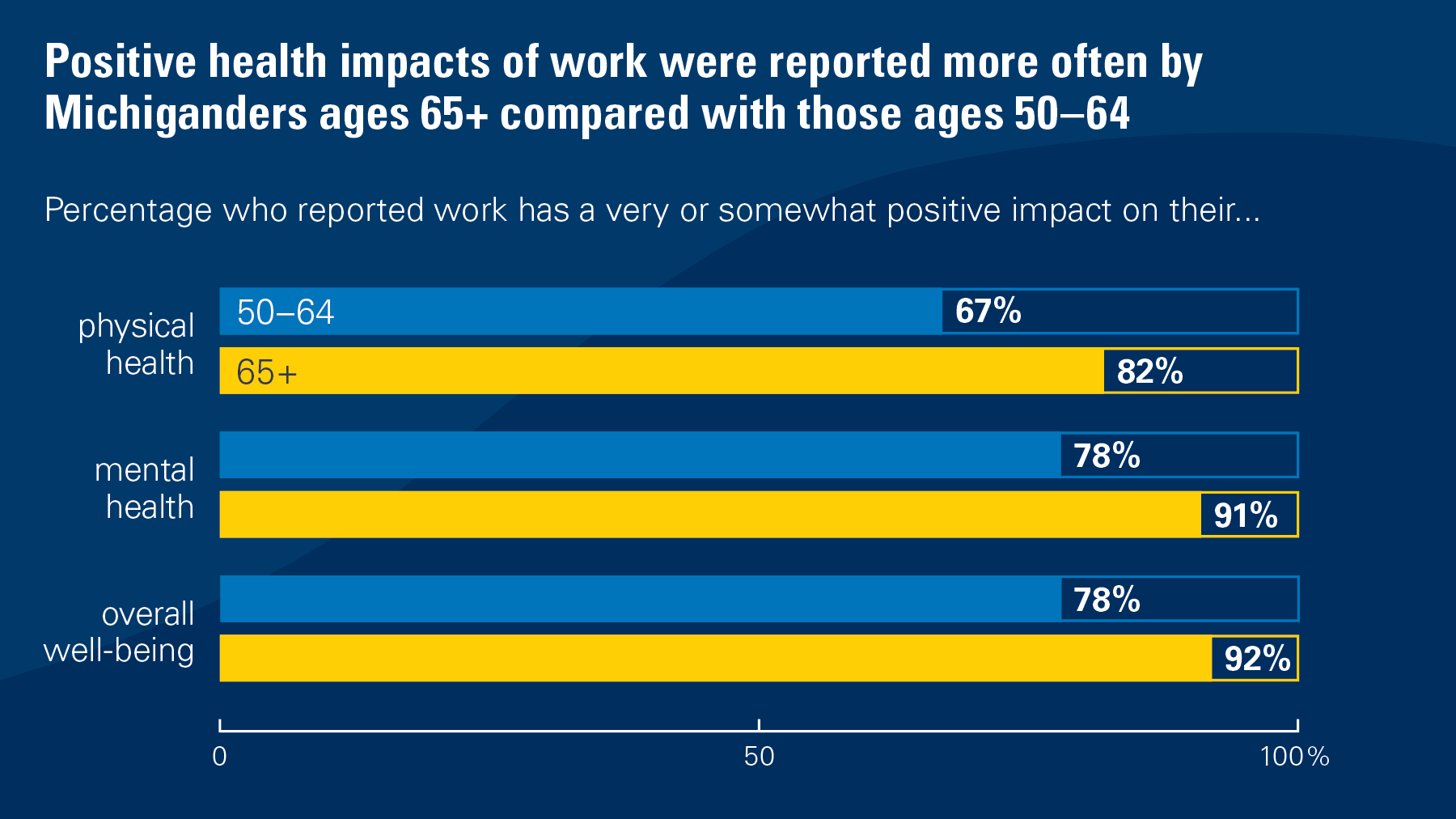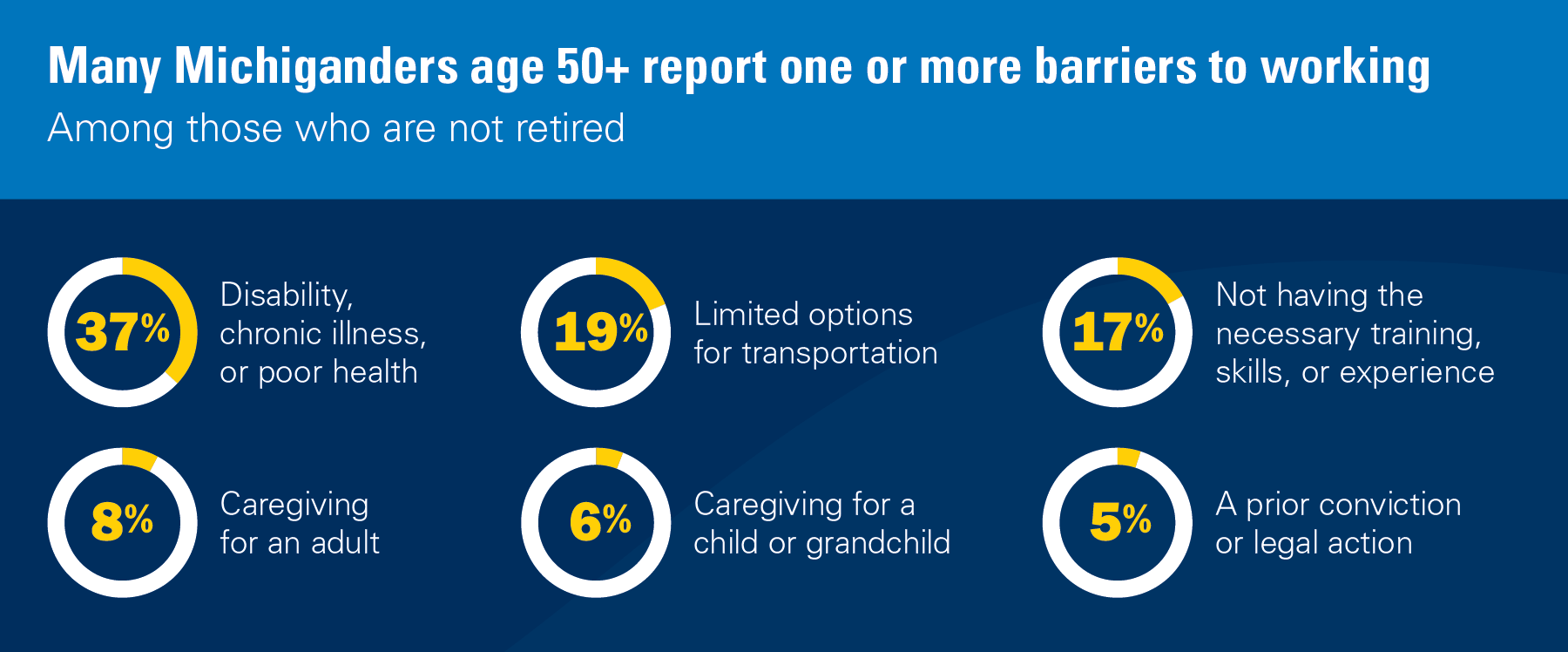
Key Findings
- In all, 34% of Michiganders age 50 and older currently work, either for an employer or are self-employed, compared with 42% of people age 50 and up in the rest of the U.S.
- Older Michiganders who currently work were more likely than their peers in the rest of the country to say that their work has positive effects on their mental health (81% vs 71%).
- 46% of Michigan adults age 50 and older who are not retired reported experiencing one or more barriers that interfere with their ability to work; the most common barriers were disability, chronic illness, or poor health.
Whether they’ve worked in the auto industry, agriculture, health care, education, tourism or another field, today’s Michiganders over 50 have played a major role in the state and national economy. Now, a new poll looks at the relationship between work and health in this age group, both for those who still work and for those who haven’t yet retired but aren’t currently working.
In all, 34% of Michiganders over the age of 50 currently work, either for themselves or for others, compared with 42% of people over 50 in the rest of the country. Older working Michiganders include 50% of all those in the 50 to 64 age group, and 17% of those age 65 and over.
In many ways the new findings from the Michigan Poll on Healthy Aging echo the findings of a new National Poll on Healthy Aging report on the same topic.
But there are key differences that may indicate areas where Michigan policymakers and employers might want to focus their attention.
The poll is based at the University of Michigan Institute for Healthcare Policy and Innovation, and supported by the Michigan Health Endowment Fund and Michigan Medicine, U-M’s academic medical center.

Positive feelings about working after 50
More than two-thirds of older Michiganders who work for themselves or others said their work positively impacts their physical health and well-being, similar to their peers in the rest of the U.S.
And older Michiganders who currently work are even more likely than their peers in the rest of the country to say that their work has positive effects on their mental health. Fully 81% of working Michiganders said their work affects their mental health in a positive way, compared with 71% of other older Americans across the country who work.
Michiganders over 65 who still work were more likely than those in their 50s and early 60s to say that working has positive effects on their physical health, mental health and overall well-being.
Job satisfaction among older working Michiganders also paralleled the rest of the nation, with 49% saying they’re very satisfied with their job and 42% saying they’re somewhat satisfied.
“Our state’s reputation for hard-working people was built in part by those who are now over age 50, and our data suggest many of them who still work get positive health benefits from it,” said poll director Jeffrey Kullgren, M.D., M.P.H., M.S., a primary care physician at the VA Ann Arbor Healthcare System and associate professor of internal medicine at U-M. “However, we also found some areas for concern, which we hope will prompt more examination.”
Data from the poll can be explored through an interactive data dashboard that also lets users compare Michigan to the rest of the country. Find that tool at https://michmed.org/geZ3B.
Differences between Michigan and the rest of the nation
Michiganders over 50 were more likely than their peers nationwide to say they aren’t working for another reason besides being retired. In all, 22% of all Michiganders aged 50 and over said this, compared with 15% of older adults in the rest of the U.S.
The percentage saying they don’t work for pay and aren’t retired was highest among Michiganders who are age 50 to 64, of whom 38% reported this status. By contrast, only 6% of those age 65 and over said they weren’t working for pay but weren’t retired.
Other groups with high percentages of non-working, non-retired individuals included those who reported being in fair or poor physical health (54%); those who reported being in fair or poor mental health (49%); and those who have a disability that limits their activities (38%).
The poll also asked about barriers to working among those who are not retired, whether or not they currently work. In all, 46% of non-retired Michiganders over 50 reported experiencing one or more barriers that interfered with their ability to work. Michiganders aged 50 to 64 were more likely to report barriers to working compared with those age 65 and older (50% vs. 31%).
The poll asked specifically about health-related barriers. In all, 37% of non-retired Michiganders over 50 say they have a disability, chronic illness or poor health status that is a barrier to working. That’s higher than the 29% of non-retired adults over 50 in the rest of the country who said they have one of these health-related barriers to working.
Even so, health-related barriers did not always keep older adults from working. For instance, 18% of Michiganders over 50 who reported having a disability that limits their activities said they are currently working.
Caregiving posed another barrier to work. Among people over 50 who work, 19% of Michiganders disagreed or strongly disagreed with the statement that they can take time off work to deal with caregiving responsibilities.
Other barriers to work reported by non-retired Michiganders over 50 included transportation (19%), lack of skills, training or experience (17%), caregiving for an adult (8%), caregiving for a child or grandchild (6%) and a prior conviction or legal action (5%).

Other work and health findings
There were also major regional differences in working for those 50 and older within Michigan. Most notably, 45% of older adults in southeast Michigan work for pay, much higher than the percentage in other areas of the state (21% in the south central and southwest region, 26% in the central region and 28% in the northern region and upper peninsula)
Working partially or fully remotely was much more common among southeast Michiganders who work for employers (44%) compared with their peers in the rest of the state.
Michiganders over 50 who work, and their peers nationwide, were similar in the percentage who said that financial stability, saving for retirement and supporting their family are important reasons they work.
The poll findings come from a nationally representative survey conducted by NORC at the University of Chicago for IHPI and administered online and via phone in August 2024 among 1,175 Michigan older adults and 3,137 non-Michigan adults ages 50 - 94. The samples were subsequently weighted to reflect the Michigan and U.S. populations.
Read past National Poll on Healthy Aging reports and about the poll methodology.